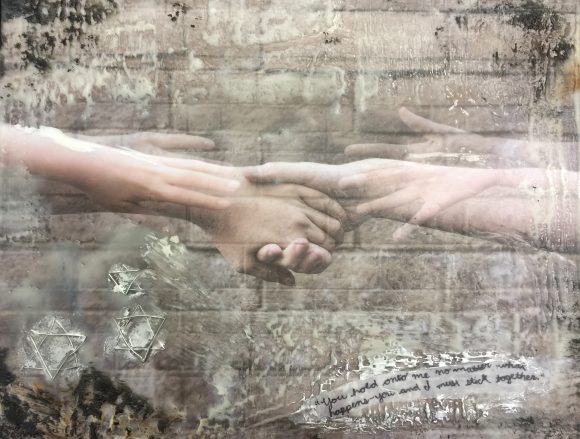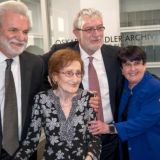Remembering–With Purpose Evening of Holocaust Remembrance
May 2, 2016
This Tuesday, May 3, at 7 p.m., in Memorial Hall on the Chapman University campus we will gather once again as a community of Holocaust remembrance. On our first occasion of remembrance, in April 2000, we screened the haunting documentary
The Last Days
, directed by James Moll, that focused on the last phase of Nazi genocide, the deportation of the Hungarian Jews. Of the five survivors whose testimonies form the core of the film, two have passed away, including our speaker that evening, Bill Basch.
Sixteen years later, we are now in “the last days” of a different sort, the last days in which we will be able to hear directly from those who witnessed to those events we call the Holocaust. For close to two decades, we have been fortunate to have a great many of those witnesses on our Chapman University campus. They are survivors of Buchenwald, Auschwitz, Sobibor, Mauthausen, and many other camps; they survived in hiding in the Netherlands, Belgium, and Poland. On occasions such as this, in past years, we welcomed close to one hundred survivors and witnesses, many of them members of The 1939 Society. This year the number will be much, much fewer. Almost all will be in their late 80s and 90s. Each is frail with health issues that give them more than enough reason to stay home. No one could blame them for not making the tremendous effort it will take tocome to Chapman. And yet, they come; no one needs to tell them it may be for the last time.
Increasingly the responsibility for memory has passed to the second and third generations. Defined narrowly, that means the children, grandchildren, and even the great-grandchildren of survivors. But the responsibility for memory need not–nor should it–be limited to them. Memory is, after all, like history itself, our
shared
human story. If witnessing is a heavy responsibility, both a privilege and a burden, witnessing to the witnesses is an even greater one. It takes desire and commitment, a strong will to learn and a deep sense of humility, knowing that one can never truly articulate that which one did not experience while also affirming that memory lives only when it is told forward.
On Tuesday evening, South African artist Leora Raikin will be doing just that, “telling forward” the story of her great uncle David Labkovski whose art portrayed Vilna, known as the Jerusalem of Lithuania, before the Holocaust and after its destruction. Memory will also be carried forward by music, some written during the time of the Holocaust, and by the lighting of memorial candles.
The six candle lighters, all survivors and witnesses to the Holocaust, will be accompanied by six first-prize recipients in this year’s
Holocaust Art and Writing Contest
sponsored by Chapman University and The 1939 Society. Two other students, one on stage and one via taped message from Johannesburg, South Africa, will share the prose and poetry entries they wrote in response to survivors’ oral testimony. Gemma Davies, the student in South Africa, wrote her poem about the brother of survivor Engelina Billauer–who will be at the event. Daanesh Jamal wrote his essay about Sam Goetz (Z”L) who spoke often at Chapman and was a leader in The 1939 Society. Daanesh and Gemma, Grace and Amanda, Eunice and Kenzington, Sophia and Hailey–these six middle and high school students embody many ethnicities, backgrounds, and beliefs. Each has a different personal story. Each has chosen to make a survivor account from the Holocaust part of his or her memory. Each has made a commitment not only to tell it forward, but to tell it forward
with purpose
. As Daanesh writes, “we can choose to revel in that hatred of our darkest night or to live in the light of a new day. The choice is ours.”
I hope you will join us on May 3 at 7 p.m. in the Chapman Auditorium in Memorial Hall at Chapman University. For more information, please call 714 532-7760.



